The Strategic Advisory Board consists of U-M leaders from our different colleges and schools. This Board makes strategic recommendations about the center’s goals and orientations.
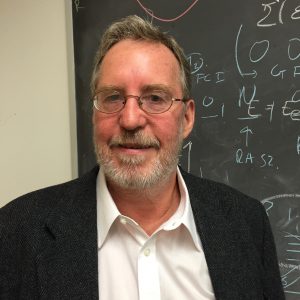
Warner-Lambert/Parke-Davis Professor of Chemistry, Cyrus Levinthal Distinguished University Professor of Chemistry and Biophysics, Director, Department of Biophysics, Professor of Chemistry and Professor of Biophysics
brookscl@umich.edu
Charles L. Brooks III, Ph.D.
Charles L. Brooks, III, Ph.D. is the Warner-Lambert/Parke-Davis Professor of Chemistry, Professor of Biophysics and Chair of Biophysics at the University of Michigan. Professor Brooks received his B.Sc. in Chemistry and Physics from Alma College, Alma, MI in 1978 and did his Ph.D. studies in Physical Chemistry with Steven A. Adelman at Purdue University, where he studied the non-equilibrium statistical mechanics of solution reactions and graduated in 1982. He was a postdoctoral fellow and a NIH Postdoctoral Fellow with 2013 Chemistry Nobel Prize winner Martin Karplus at Harvard University between 1982-85. Professor Brooks joined the faculty of Carnegie Mellon University as an Assistant and rose through the ranks to Full Professor of Chemistry between the years of 1985-94. In 1994 Dr Brooks moved to the Scripps Research Institute as a Professor in the Department of Molecular Biology, where he carried out research in theoretical biophysics and chemistry between the years of 1994-2007.
Professor Brooks moved to the University of Michigan as the Warner-Lambert/Parke-Davis Professor of Chemistry and Professor of Biophysics in 2008, and took the position as the Director of Biophysics in 2015. Professor Brooks’ research interests span a broad range of biophysics including protein structure, function and folding studied with molecular simulations; small-molecule – protein and RNA interactions; protein-protein and protein – RNA interactions; the role of pH in modulating protein and nucleic acid structure and function; RNA and DNA structure, function, dynamics and folding. Dr Brooks has received a number of honors and recognitions throughout his career including a NIH Postdoctoral Fellow, an Alfred P. Sloan Foundation Fellow, Fellow of the American Association for the Advancement of Science, Fellow Royal Society of Chemistry, he was cited as “Top 100 chemists of the decade, 2000-2010” by Science Watch (Thomson Reuters), he was recognized as the Purdue University Alumni of the Year in 2010, he received the Hans Neurath Award of the Protein Society in 2012, he served as a member of Executive Council of the Protein Society between 2014 – 2016, he was the Gilda Loew Lecturer, ISQBP in 2014, he was elected a Fellow of the Biophysical Society in 2016, and is President Elect/President of the Protein Society, 2016-2020.
Professor Brooks has mentored more than one hundred post-, pre- and under-graduate students throughout his career, with more than forty of his former students currently pursuing careers in academia. He has served as the North American Editor-in-Chief for the Journal of Computational Chemistry since 2004 and is on the Editorial Advisory Boards for Proteins, Journal of Molecular Biology and Molecular Simulation. He is currently Co-chair/Chair of the Proteins Gordon Research Conference, 2017/2019 and is a NIH Charter Member of MSFD and serves as a NSF MCB Biophysics panel member. Finally, Dr Brooks has published more than 380 manuscripts and reviews, including an important book reviewing the methods of theoretical biophysics and simulation applied to protein structure and function in 1987.
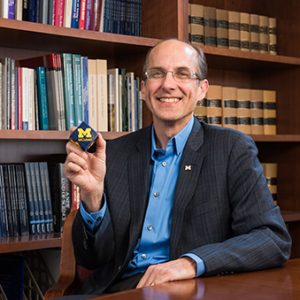
T C Chang Professor of Engineering, Professor of Chemical Engineering, Professor of Biomedical Engineering, College of Engineering and Executive Director, MCubed and Research Innovation
maburns@umich.edu
Mark Burns, Ph.D.
Mark Burns, Ph.D. is the T. C. Chang Professor of Engineering and Anthony C. Lembke Department Chair of Chemical Engineering at the University of Michigan. He obtained his BS in Chemical Engineering from the University of Notre Dame and his MS and PhD in Chemical and Biochemical Engineering from the University of Pennsylvania. He taught at the University of Massachusetts before joining the University of Michigan.
Prof. Burns has over 150 publications and patents. He is a Fellow of the National Academy of Inventors and the American Institute for Medical and Biological Engineering. He has won numerous awards including both Research Excellence and Teaching Excellence awards from Michigan. He started the NIH-funded Microfluidics in Biomedical Sciences graduate training program, and he is co-founder and Director of MCubed, a $30M innovative seed-funding program.
Dr. Burns’ group has published extensively on microfluidic technology. In the late ‘90s, his collaborative research team constructed arguably the first microfabricated integrated DNA analysis device. Since then, Dr. Burns has published on a variety of microfluidic systems including a nanoliter viscometer and an influenza detection and subtyping device. His current work centers on constructing inexpensive diagnostic systems and cost effective sensors for a variety of applications.
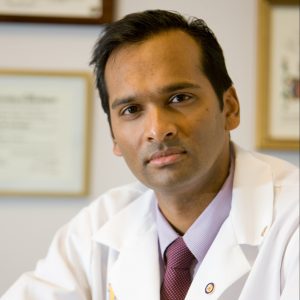
S P Hicks Endowed Professor of Pathology, Professor of Pathology and Professor of Urology
arul@umich.edu
Arul M. Chinnaiyan, M.D., Ph.D.
Arul M. Chinnaiyan, M.D., Ph.D. is a Howard Hughes Medical Institute Investigator (HHMI) in Patient-Oriented Research, an American Cancer Society Research Professor, the S.P. Hicks Professor of Professor of Pathology and Urology and an affiliated faculty of the Bioinformatics Program at the University of Michigan Medical School. He has received a number of prestigious awards including the Pew Biomedical Scholar Award, the Amgen Outstanding Investigator Award, AACR Outstanding Investigator Award, the Benjamin Castleman Award, Paul Marks Prize for Cancer Research. Most notably, his research group was the recipient of the 2007 AACR Team Science award for the discovery of recurrent gene fusions in prostate cancer.
He was elected to the National Academy of Medicine of the National Academy of Sciences in 2009 and was named 2014 National Academy of Inventors Fellows. He was elected a Member of the National Academy of Sciences, which is considered one of the highest honors that a scientist can receive, in 2020.
Dr. Chinnaiyan led the development of the popular cancer profiling bioinformatics resource called Oncomine (www.oncomine.org) (hosting over 20,000 registered users from over 30 countries and serving 16 of the 20 top oncology biopharma). In 2007, he was named the founding Director of the Michigan Center for Translational Pathology (MCTP). The Center was formed as a focused initiative to translate discoveries made in the laboratory to clinical impact in terms of novel diagnostics and therapeutics. The recent focus of the Center has been in the area of translating next generation sequencing-based approaches for use in personalized oncology.
Dr. Chinnaiyan is a board-certified clinical pathologist with diverse expertise in cancer genomics, next generation sequencing (NGS), bioinformatics and biomarker development. He leads a multi-disciplinary team of investigators at MCTP with expertise in pathology, genomics, proteomics, bioinformatics, cytogenetics, biostatistics, next generation sequencing and cancer biology. In addition, Dr. Chinnaiyan oversees the Center’s CLIA/CAP NGS laboratory, an extension of the U-M Department of Pathology.

Emanuel N Maisel Professor of Oncology
Director, University of Michigan Rogel Cancer Center
fearon@umich.edu
Eric Fearon, M.D., Ph.D.
Eric Fearon was named director of the University of Michigan Rogel Cancer Center in 2016. He has served as the Emanuel N. Maisel Professor of Oncology and was appointed associate director for basic science research at the Cancer Center in 1995. He also served as deputy director, from 2005-2016.
Eric Fearon is pursuing research in the cancer genetics field, particularly investigating the pathways by which specific oncogene and tumor suppressor gene defects contribute to the pathogenesis of colon and other cancers and result in progression to advanced disease stages. Recently, he and his laboratory have studied the effects of miRNAs on cancer and have developed novel strategies for the early detection and treatment of colorectal adenomas and carcinomas.
Fearon has authored more than 135 peer-reviewed research manuscripts and more than 60 review/editorial articles and book chapters. As a professor of internal medicine in Human Genetics and Pathology, he has pursed research in the cancer genetics field, particularly investigations of selected gene defects that underlie colon and rectal tumor development and progression to advanced stages. He has served on the editorial boards of various journals in the cancer biology and human genetics fields and currently is an editorial board member or editor for a number of journals, including The Journal of Biological Chemistry, Current Biology, Journal of Clinical Investigation, Gastroenterology and Molecular Cancer Research. In addition, he has served as a member or chair of various National Institutes of Health and National Cancer Institute advisory groups and grant review committees, including the Panel to Investigate the NIH Investment in Gene Therapy, the National Cancer Institute Board of Scientific Advisors, and the NIH Pathology B and Cancer Genetics Study Sections. He is also a fellow of the American Association for the Advancement of Science.
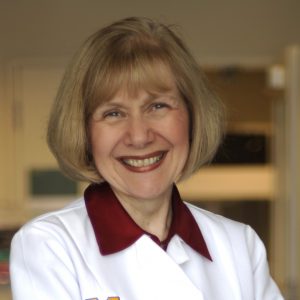
Russell N DeJong Professor of Neurology and Professor of Neurology
efeldman@umich.edu
Eva Feldman, M.D., Ph.D.
In addition to her active clinical practice in neurology and position as the Russell N. DeJong Professor of Neurology at the UM Medical School, Eva Feldman, M.D., Ph.D. is Director of the A. Alfred Taubman Medical Research Institute and is Director of Program for Neurology Research & Discovery. Dr. Feldman is interested in understanding the pathogenic mechanisms that trigger neurodegeneration in the central and peripheral nervous systems and identifying effective therapies. She directs a multifaceted research program encompassing basic science, clinical, and translational research.
Dr. Feldman’s laboratory utilizes cellular disease models, animal disease models, stem cell biology, and computer-based analyses to gain comprehensive insight into disease processes. Specific projects are detailed on the Program for Neurology Research & Discovery’s website (www.pnrdfeldman.org) and focus on understanding how conditions such as diabetes, Alzheimer’s disease (AD), and amyotrophic lateral sclerosis (ALS) damage nerve cells. Her diabetic neuropathy research program combines cell and animal models and human tissues with advanced molecular and bioinformatics analyses to characterize and understand the mechanisms underlying nerve damage associated with diabetes.
Dr. Feldman’s multifaceted neurodegenerative disease research program involves in vitro, in vivo, and clinical research to elucidate the mechanisms and develop novel therapies for ALS and AD. Her lab has developed cellular models of ALS expressing mutant forms of TDP-43, an RNA-binding protein linked to ALS pathogenesis, to examine disease pathogenesis and screen potential therapies, and have established the University of Michigan ALS Patient Repository (UMAPR) which contains viable biospecimens from ALS subjects and healthy controls paired with robust clinical data. These unique resources are being utilized to identify potential ALS risk factors associated with environmental exposures and to characterize how epigenetic modifications impact gene expression, contribute to the development of ALS, and can be used as diagnostic and prognostic biomarkers.
Specifically, Dr. Feldman’s lab is profiling microRNA expression in ALS patient tissues and biofluids from the UMAPR to identify significantly altered candidates associated with ALS, as well as using in patient skin fibroblasts to assess how alterations in TDP-43 and other RNA-binding proteins promote microRNA dysregulation and changes in mRNA stability. Overall, the knowledge gained from these projects will identify targets that are most amenable to conventional or novel therapies, identify biomarkers that offer diagnostic and prognostic advantages, and enable development of new comprehensive treatment strategies that can be translated to patients.
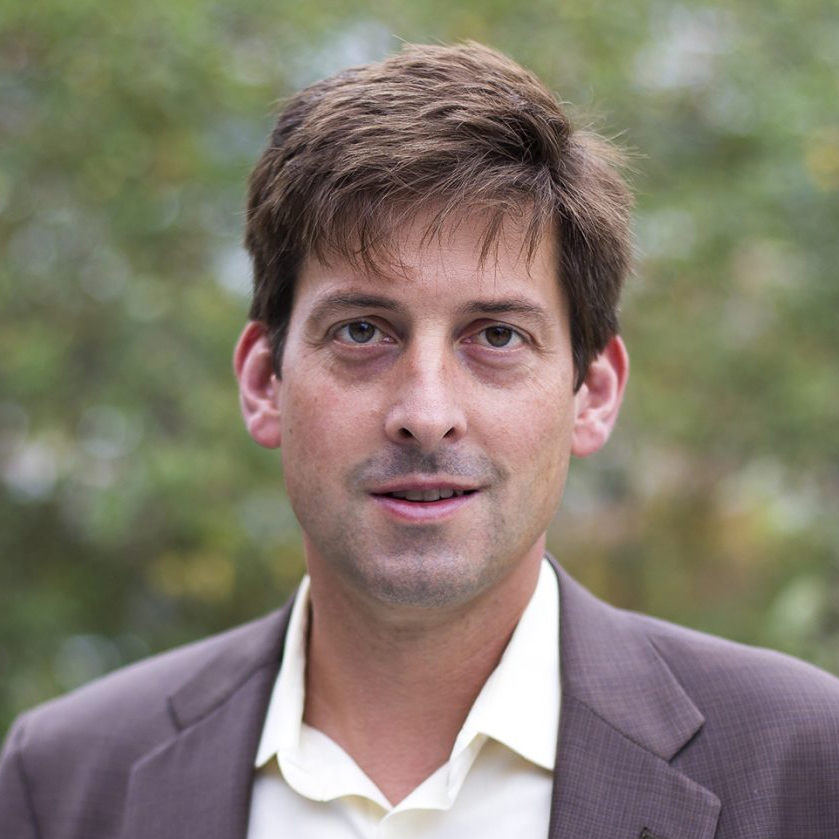
Director, Biointerfaces Institute
Wolfgang Pauli Collegiate Professor
of Chemical Engineering
Professor, Biomedical Engineering, Macromolecular Science & Engineering, and Materials Science & Engineering
Co-Director, Institute of Functional Interfaces
Karlsruhe Institute of Technology
lahann@umich.edu
Joerg Lahann’s research is broadly related to surface engineering with strong ties to biomedical engineering and nanotechnology. Earlier this year, his research on reversibly switching surfaces was featured in an article in Science (J. Lahann, et al., A Reversibly Switching Surface, January 17, 2003, 299, 371-374.) These “smart surfaces” can reversibly switch properties in response to an external stimulus. To demonstrate these findings, a surface design was developed that can be changed from water-attracting to water-repelling with the application of a weak electric field. Designed as a switch, single-layered molecular-level machines are aligned on a surface using self-assembly and then are flipped between defined microscopic states. This type of surface design may offer a new paradigm for interfacial engineering as it amplifies reversible conformational transitions at a molecular level to macroscopic changes in surface properties without altering the chemical identity of the surface.
Joerg has also developed a novel class of polymers with potential for biomimetic and spatially directed surface engineering. This “reactive coating” technology uses chemical vapor deposition (CVD) polymerization to deposit a wide range of chemical signatures on various substrate materials. Its simplicity in providing chemically reactive groups and its applicability to three-dimensional geometries (e.g. for microfluidics) enables the exact tailoring of surface properties and the preparation of biologically relevant microenvironments. Reactive coatings are compatible with soft lithographic processes, allowing for patterning of proteins, DNA, cytokines, and mammalian cells.
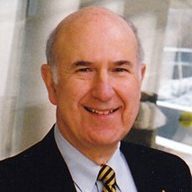
Harold T Shapiro Distinguished University Professor of Medicine, Professor of Computational Medicine and Bioinformatics, Professor of Internal Medicine, Professor of Human Genetics, Professor of Public Health
gomenn@umich.edu
Gilbert S. Omenn, M.D., Ph.D.
Gilbert S. Omenn, M.D., Ph.D. is the Harold T. Shapiro Distinguished University Professor of Computational Medicine & Bioinformatics, Internal Medicine, Human Genetics, and Public Health at the University of Michigan. He was Chief Executive Officer of the UM Health System, 1997-2002. He was Dean, School of Public Health, and Professor of Medicine and Environmental Health, University of Washington, Seattle, 1982-1997. His research interests include cancer proteomics, splice isoforms, public health genetics, science-based risk analysis, and health policy. He is affiliate faculty member at the Institute for Systems Biology, Seattle. He was PI of the beta-Carotene and Retinol Efficacy Trial (CARET) of preventive agents against lung cancers and heart disease at Fred Hutchinson Cancer Research Center. He was a White House Fellow at the U.S. Atomic Energy Commission, 1973-74; Associate Director, Office of Science and Technology Policy, and Associate Director, Office of Management and Budget, for President Carter, 1977-1981. He was President of the American Association for the Advancement of Science (AAAS) in 2006.
Omenn is the Chair of the HUPO Human Proteome Project which has a major focus on proteogenomics and splice variants. He has had NIH grants over four decades and was a Howard Hughes Medical Investigator. President Obama appointed him to the NIH Scientific Management Review Board. He is author of 578 research papers and scientific reviews, author/editor of 18 books. He advised the Shanghai Jiao Tong University Medical School and is an honorary faculty of Peking Union Medical College. He is an elected member of the National Academy of Medicine, American Academy of Arts and Sciences, Association of American Physicians, and American College of Physicians. He chaired the presidential/congressional Commission on Risk Assessment and Risk Management (“Omenn Commission”). He received the Walsh McDermott Medal from the Institute of Medicine in 2008 for long-term contributions to the IOM and the National Academy of Sciences; and the David Rogers Award from AAMC in 2013 for major contributions to health and health care in America.
Omenn holds BA from Princeton, MD from Harvard Medical School, and PhD in genetics from the University of Washington. He has three children and five grandchildren. He is active in cultural, educational, and public policy organizations, a musician and tennis player.

Lucile Groff Chair of Neurology for Alzheimers Disease and Related Disorders and Professor of Neurology
henryp@umich.edu
Henry L. Paulson, M.D., Ph.D.
Henry L. Paulson, M.D., Ph.D. is the Lucile Groff Professor of Neurology for Alzheimer’s Disease and Related Disorders in the Department of Neurology at the University of Michigan. Dr. Paulson joined the UM faculty in 2007, and he currently directs the Michigan Institute for Neurodegenerative Diseases (MiND) and co-directs the Protein Folding Diseases Initiative.
Dr. Paulson’s research and clinical interests concern the causes and treatment of age-related neurodegenerative diseases, with a focus on hereditary ataxias and Alzheimer’s disease. In 1997, his lab described abnormal protein aggregates in the so-called polyglutamine diseases, which now are recognized as a pathological hallmark in this important class of inherited diseases. Using test tube, cell-based and animal models, he has contributed to advances in the understanding of various neurodegenerative diseases. His lab also has helped pioneer the use of RNA interference as potential therapy for the many hereditary neurological disorders caused by “toxic” mutant genes.
Nationally, Dr. Paulson has directed popular courses at the American Academy of Neurology meetings, serves on the scientific advisory boards of numerous disease-related national organizations, and belongs to the Board of Scientific Counselors at the National Institute for Neurological Disorders and Stroke at the National Institutes of Health.
Among his awards, Dr. Paulson is an Ellison Medical Foundation New Scholar in Aging, a semifinalist for the W.M. Keck Foundation Young Scholars in Medical Research, and a recipient of the Paul Beeson Physician Faculty Scholar in Aging Award from the American Federation for Aging Research.
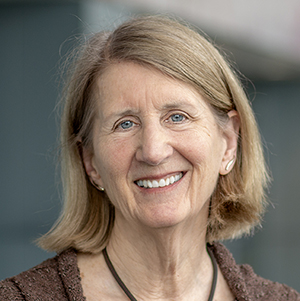
Dr. Janet Smith, Martha L. Ludwig Distinguished University Professor of Biological Chemistry, Medical School; Margaret J Hunter Collegiate Professor in the Life Sciences; Associate Director, Life Sciences Institute; and Professor of Biophysics, LSA
janetsmi@umich.edu
Janet Smith, Ph.D. is the Martha L. Ludwig Distinguished University Professor of Biological Chemistry and Margaret J Hunter Collegiate Professor in the Life Sciences. She is the Associate Director of the Life Sciences Institute and Professor of Biophysics at the University of Michigan. Her research focuses on understanding biological processes through knowledge of the structures of key protein molecules. She has made major contributions to the understanding of catalysis and regulation in glutamine amidotransferases and phosphoribosyltransferases by solving and interpreting crystal structures of several enzymes of each type. She has solved crystal structures of photosynthetic proteins, leading to a new understanding of their function. Dr. Smith has also contributed to the development of methods for rapid determination of protein crystal structures, particularly using synchrotron X-ray sources. She rose to the rank of Professor at Purdue University before joining the University of Michigan.
In 2007, she was inducted as a Fellow of the American Association for the Advancement of the Sciences. She was elected a Member of the National Academy of Sciences, which is considered one of the highest honors that a scientist can receive, in 2020.
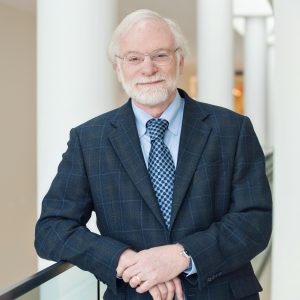
Madeline and Sidney Forbes Professor of Oncology and Professor of Internal Medicine
mwicha@umich.edu
Max S. Wicha, M.D. is the Madeline and Sidney Forbes Professor of Oncology. He earned his M.D. at Stanford University School of Medicine and was a Clinical Oncology Fellow at the National Cancer Institute. He is also a co-founder of OncoMed Pharmaceuticals. As founding director of the UM Comprehensive Cancer Center, Dr. Wicha is responsible for coordinating all cancer activities related to research and patient care. He is nationally known for his research in the field of breast oncology. His lab was part of the team that first discovered stem cells in breast cancer, the first described in any human solid tumor. Since then, Dr. Wicha has become one of the leading experts on cancer stem cells. Dr. Wicha is also active as a clinician, specializing in the treatment of breast cancer patients. In 1999, he became an American Cancer Society Honoree and in 2000 he was inducted a Fellow of the American Association for the Advancement of the Sciences.
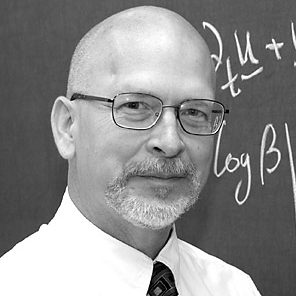
Nicholas D Kazarinoff Collegiate Professor of Complex Systems, Mathematics and Physics, Director, Center for the Complex Systems, Professor of Mathematics, Professor of Physics and Professor of Complex Systems
In Memoriam, Charles R. Doering, Ph.D.
Charles R. Doering, Ph.D. was the Nicholas D Kazarinoff Collegiate Professor of Complex Systems, Mathematics and Physics and the Director of the Center for the Study of Complex Systems. Professor Doering’s research focused on the analysis of mathematical models with the aim of extracting reliable, rigorous, and useful predictions. These models ranged from stochastic, dynamical systems arising in biology, chemistry and physics, to systems of nonlinear partial differential equations such as those that (ostensibly) describe turbulent fluid flows. The techniques employed range from the development of exact solutions to the application of modern mathematical methods including rigorous estimation, careful numerical computations and simulations, and the use of abstract functional and probabilistic analysis — often a combination of all three approaches.
